Politics
Supreme Court Upholds Same-Sex Marriage Rights, Dismisses Challenge

The United States Supreme Court has confirmed its commitment to same-sex marriage rights by declining to hear a case that sought to challenge the landmark ruling established in 2015 in the case of Obergefell v. Hodges. This decision alleviates concerns that recent political changes could jeopardize the constitutional protections surrounding marriage equality.
The petition originated from Kim Davis, a former county clerk in Rowan County, Kentucky. Davis gained national attention after she refused to issue marriage licenses to same-sex couples following the Obergefell ruling, which legalized same-sex marriage nationwide. Her actions led to a brief jail sentence for contempt of court and a subsequent order to pay damages.
This recent Supreme Court decision underscores an important principle: personal beliefs should not interfere with the civil rights guaranteed by the Constitution. As articulated by Justice Anthony Kennedy in the majority opinion of the Obergefell case, the Constitution mandates equal dignity for all individuals under the law.
Civil Law vs. Religious Beliefs
The distinction between civil and religious law is crucial in this context. While individuals are free to practice their faith, these beliefs cannot dictate the legal rights that others are entitled to under civil law. The refusal to issue marriage licenses to same-sex couples constituted an infringement on their rights, which the judiciary ultimately rectified.
Davis’ case, now definitively closed, reinforces the strength of the Obergefell precedent. The Supreme Court’s decision to not take up her appeal signifies a broader commitment to uphold the rights of same-sex couples. The absence of public dissent among the justices on this matter signals a unified stance on the issue.
The Protection of Rights
The rights that same-sex couples enjoy today—including tax benefits, property rights, and critical healthcare decisions—are essential for their equality in society. These rights were not always guaranteed, as previous legal frameworks allowed for discrimination based on sexual orientation.
Illinois was among the first states to embrace marriage equality, legalizing same-sex civil unions in 2011 and marriage in 2013. The relatively recent establishment of these rights serves as a reminder of the ongoing struggle for equality faced by LGBTQ+ individuals across the United States and beyond.
In light of the Supreme Court’s decision, advocates for equality can take heart in the affirmation of civil rights. The refusal to hear Davis’ challenge not only upholds the precedent set by Obergefell but also reinforces the idea that constitutional protections cannot be subject to majority opinion.
This editorial perspective comes from the Chicago Tribune Editorial Board, reflecting a commitment to the principles of equality and justice for all citizens. The court’s recent action serves as a positive development for those who value freedom and civil rights across the nation.
-

 Politics3 weeks ago
Politics3 weeks agoHamas Chief Stresses Disarmament Tied to Occupation’s End
-

 Science3 weeks ago
Science3 weeks agoOhio State Study Uncovers Brain Connectivity and Function Links
-

 Entertainment3 weeks ago
Entertainment3 weeks agoMegan Thee Stallion Exposes Alleged Online Attack by Bots
-

 Science4 weeks ago
Science4 weeks agoResearchers Challenge 200-Year-Old Physics Principle with Atomic Engines
-

 World2 weeks ago
World2 weeks agoFDA Unveils Plan to Cut Drug Prices and Boost Biosimilars
-

 Entertainment3 weeks ago
Entertainment3 weeks agoPaloma Elsesser Shines at LA Event with Iconic Slicked-Back Bun
-

 Top Stories3 weeks ago
Top Stories3 weeks agoFederal Agents Detain Driver in Addison; Protests Erupt Immediately
-

 Business3 weeks ago
Business3 weeks agoMotley Fool Wealth Management Reduces Medtronic Holdings by 14.7%
-

 Entertainment2 weeks ago
Entertainment2 weeks agoBeloved Artist and Community Leader Gloria Rosencrants Passes Away
-

 Business3 weeks ago
Business3 weeks agoHome Depot Slashes Prices on Halloween Favorites Up to 75%
-

 Top Stories3 weeks ago
Top Stories3 weeks agoOrioles Hire Craig Albernaz as New Manager Amid Rebuild
-

 Business2 weeks ago
Business2 weeks agoShutdown Impacts Millions as Deadline Approaches, Pressures Congress









